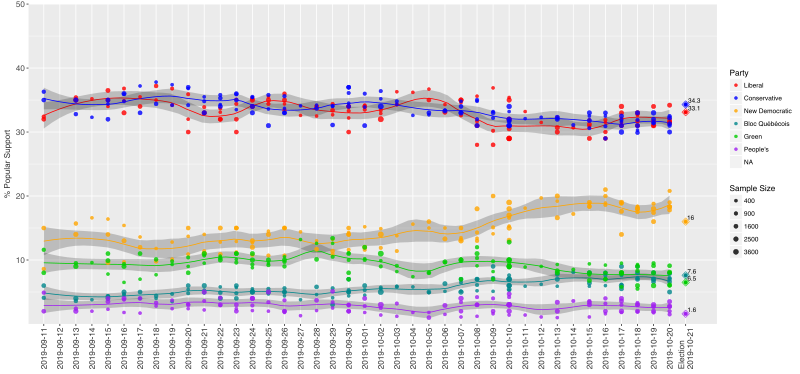Canada has an election tomorrow. Try not to get too excited!
In all seriousness, I know some peoples from Canada (on the internet), and this fact has caused me to become interested in this upcoming election (as of yesterday). I noticed that there was a debate between the leaders of the various parties held in English not long ago, so I just gave that a watch. Here it is for those of you who are interested in learning what the major issues are in this election and an approximation of where the parties stand on them:
My thoughts (which will take more than 40 seconds to share):
This debate was about 50 times more lively than the 2015 one I saw, which was absolutely dull. I see that political polarization has finally arrived in Canada now too. And it would appear that the catalyst has been last year's IPCC climate report.
I found the debate mildly interesting. I mean the two main candidates, Justin Trudeau and Andrew Scheer, are a forgettable joke. Trudeau strikes me as a corrupt and dishonest person who relies on a lot of canned lines. And he also has an awful lot to say about who Canada's individual provinces should and should not elect and what internal policies they should and should not be allowed to have. The Conservative guy, Scheer, I think is trying to be the least offensive rightist one can possibly be. He's nothing like Trump at all in terms of how he talks or in terms of where he stands on a number of issues like immigration. But he's got nothing to offer. You can feel it. You can feel that he's not fully speaking his mind most of the time, and you can tell it by the fact that 90% of what he's got to say are just character attacks against Justin Trudeau and not policy prescriptions. He wants to do less than nothing on the climate and that's the really key thing here.
Maxime Bernier of the People's Party is obviously a Trump-a-like xenophobic, anti-immigration reactionary. I fear that he's better at advocating for that cause than Donald Trump is though. He's a much more persuasive communicator, often speaking coherently and using real statistics and stuff. And he's clearly passionate. He also inherits a number of other traits intrinsic to the nationalist movement, such as being an all-around asshole control freak who has to inject himself into everyone else's speaking time almost constantly, making sure he's the only one who actually gets to speak half the time, talking over his rivals routinely, etc. I don't like him. He's an ultra-capitalist demagogue. Certainly though he's a more believable person than either Trudeau or Scheer, who strike one as fakes.
As to the New Democratic Party, Jagmeet Singh seems like a carbon copy of what the progressive movement in the U.S. represents in every respect, both the good and the bad. He talks like a younger Bernie Sanders most of the time, though I will say that his variety of this seems slightly more canned and prepared to my ears. I like his core economic policy ideas, which I think would be good for Canada's workers and consumers alike, but I don't like all of his views. The idea that not everyone on the stage should have been allowed to participate in the debate at all is an example of a view I definitely disagree with. That's something that, as you probably know by now, I don't like about the progressive movement of today; this whole cancel culture type of the thing where you simply refuse to engage with ideas and people you disagree with.
I also really dislike the fact that everyone on the stage except for Blanchet, the Bloc Quebecois guy, is against Quebec's Bill 21, which is just a declaration of secular statehood prohibiting public employees from wearing religious symbols on the job. Bill 21 is supported by 70% of Quebec's people and Trudeau's unique position that the central Canadian government should prohibit the law from coming into force is a view I find especially repugnant and authoritarian. More so though the argument that Singh makes about how Bill 21 is a violation of, of all things, "women's rights". I'm pretty sure that religious wear like the niqap and the burkha, which many Muslim families require their women to wear in public, are not actually a form and expression of women's liberation, as Singh implies, so much as they are a form of often culturally compulsory body shaming that implies that women who don't cover up are immoral and perhaps deserve sexual assault. No, I don't think the state needs to give official sanction to that sort of message, or to promote any faith either explicitly or implicitly.
So I think I dislike some of the NDP's views on cultural issues. I could say the same of the Liberals and the Greens and really all the parties in one sense or another. But overall, there is one overriding issue in this election that is more important than all the others, and that's the environment. What I heard from Elizabeth May of the Green Party on that issue is frankly persuasive. Whether I agree with the Greens on all of their cultural policies or not, this (the environment) is the overriding issue that's more important than anything else for not just Canada, but the world right now and May is by far the clearest on that issue. Her emissions reduction goals are nearly twice as ambitious as those of the NDP, for example. I think the Greens deserve to gain the most from this election, and it looks like they just might.
In 2015, the Green Party got just 3.45% of the national vote. Since then, they've moved well to the left like the Greens here in the U.S. I can see both in this debate and elsewhere. They're now embracing single-payer pharma care, tuition-free college, a wealth tax, a universal basic income, and a New Green Deal-like set of climate projects and climate goals almost twice as ambitious as those of the main progressive party, the New Democrats, to which end I'm not surprised that they're currently polling at 8% on average in this election as of last week's data, which, if realized tomorrow, would be more than double their vote in the last federal election. In fact, the Greens are the party around back in 2015 that appears to be expanding the most. That mirrors an international trend we're seeing since last year's IPCC report on the climate. Green parties made significant gains in the EU elections this last summer, for instance. In the U.S. Democratic Party, the environment has gone from being lowest-ranking issue priority of Democratic voters last year to the second-highest voting priority among the Democrats now, after only health care policy. The IPCC report changed everything around the politics of environmental action. It is perceived as a genuine emergency now by rapidly growing numbers of people, led by the youngest generations who will live to face the biggest consequences. If immigration is now the main issue that right wing politics revolve around, the environment is fast becoming the main issue around which left wing politics revolve, and not just here in the U.S. That's the issue polarization that I'm seeing emerging.
The only party that's lost ground in the polling so far relative to their 2015 performance is the governing Liberal Party. They got 39.47% of the vote in 2015 and are currently polling at 31% support. The difference has been dispersed among the other parties, but disproportionately the Green Party. Most of the difference appears to be going to the Greens. The Conservative Party currently polls at 32% support on average, which is exactly what they got in 2015, so there appears to be no more enthusiasm for Scheer than there was for Canada's last Conservative Prime Minister Stephen Harper at the end of his tenure. Although it is worth saying that 3% of Canadians (disporportionately located in Alberta) are supporting the new far-right People's Party instead, so it would appear that the conservative movement in Canada overall has expanded slightly since 2015 when you take their existence into account, though it seems there is little demand for Trump-esque isolationist demagogy in Canada compared to here in the U.S.
It's looking like the Bloc Quebecois has a real chance of emerging from this election as the dominant party in Quebec again for the first time this decade, it may be worth adding. Separatist sentiment appears to be growing stronger there. (The Bloc is a Quebec sovereigntist party which, for that very reason, only fields candidates in Quebec.) Aside from the Greens, the Bloc is the only other major party that existed back in 2015 that appears to be faring better in this election so far than in that one.
I would predict that the outcome of this election will be that Justin Trudeau will remain prime minister, but that he will now head up an alliance with the NDP and maybe the Greens (maybe) rather than being able to govern as a majority party, as now. The effect will probably be to push Canada's policy-making leftward, considering that those other two parties are left of the Liberals. That would be my prediction of the outcome anyway. Tomorrow's the vote, so we'll see soon enough.
So I guess for me, ranking the parties in the order that I liked their leader's performances in this debate, I'd go...
1) The Greens
2) The Bloc Quebecois
3) The New Democrats
4) The Conservatives
5) The Liberals
6) The People's Party
Okay, those are my thoughts!
Last edited by Jaicee - on 20 October 2019


























































